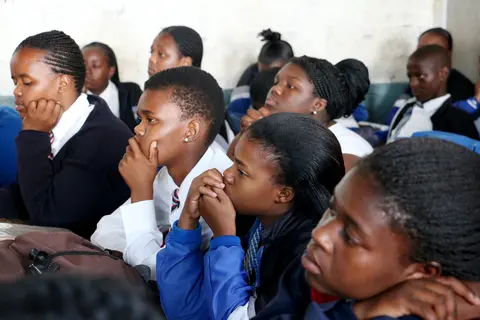Values sustain any walk to freedom
ApartheidA powerful medium for passing on messages, stories have always been used to educate and help children understand the world around them. This July, or Mandela Month, national reading-for-enjoyment campaign Nal’ibali and non-governmental organisation Heartlines are encouraging parents and caregivers to continue this tradition by using stories to pass on some of the values of the late Nelson Mandela.
Research has shown that many South Africans say that they believe in values such as honesty, forgiveness, respect, compassion and responsibility. And, according to census data, a high percentage of South Africans frequent churches, mosques, temples and synagogues where these types of values are taught. Unfortunately, there is a big gap between values and action, reflected in our high levels of corruption and abuse of women and children, to name only two examples. As an NGO focused on starting value-based conversations that transform society, Heartlines has been using stories to spark behavioural change across South Africa since 2006, helping South Africans to shift from having an awareness of values into living lives based on values-related action.
This means we’re not just using stories for their entertainment value. There are biological as well as sociological reasons why stories work better than facts when it comes to getting messages across. From a sociological point of view, stories have been shown to establish or reinforce social norms that support the behaviour that is being promoted. For example, if the characters in a story make healthy food choices, or put on sunscreen, this creates the feeling for the reader that these are activities that people simply do, and that they should do too. This is especially effective when readers identify with the characters in the story.
Further, science has begun to uncover the complex processes that take place in our brains when we are exposed to great stories. More than just the fact-related centres of the brain light up when readers resonate with a story. They can have an emotional whole-brain experience.
This remarkable fact is particularly important when it comes to passing on values and morals to children. Psychologists tell us that children learn values from stories in three different ways. Through the heart as they empathise with the characters, through the mind as they grapple with the moral logic or reasons behind why something may be good or bad, and through relationships or identification as they see values being lived out by the characters.
While some stories may be strong enough to convey their messages on their own, the greatest way caregivers can reinforce the message or the moral with children is to follow up the story with a conversation. By discussing what happened, caregivers have a natural opportunity to talk about things that might not be talked about in everyday circumstances, without moving into ‘teacher’ mode.
What’s more, when caregivers and adults read and share stories with their children, not only are they helping to anchor important principles in their daily lives, they are developing important and healthy bonds with their children, and they are indirectly supporting their children’s literacy journeys.
Heartlines is proud to have partnered with Nal’ibali this Mandela Month by sharing three of our children’s stories with its network of over 1 000 reading clubs across the country. Focusing on the values of compassion, honesty and forgiveness, the stories have been written and illustrated by South Africans and are available as special story cards in isiZulu, isiXhosa, English and Afrikaans from Nal’ibali’s website for the week of Mandela’s birthday. And, of course, they include important discussion points that will help older readers unpack and discuss these values with their children.
There are many ways to be a good parent and we hope that adults across South Africa will use this opportunity to parent in a way that is relaxed, simple and fun. Read just one story, or all three, but remember to have a conversation with your children about it and help them live Mandela’s legacy.
Jennifer Charlton has worked for Heartlines for the past 14 years, helping to produce, commission and deliver children’s stories, television shows and films which encourage values-based behavioural change among South Africans of different ages.
To access the special series of Mandela story cards, or for a range of children’s stories in different South African languages, visit www.nalibali.org. You can also follow Nal’ibali on Facebook and Twitter: @nalibaliSA.
Featured




